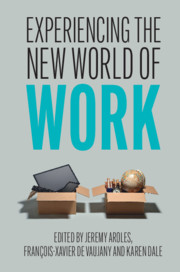Book contents
- Experiencing the New World of Work
- Experiencing the New World of Work
- Copyright page
- Contents
- Tables
- Contributors
- Foreword
- Introduction
- Part I Experiencing at Work
- Part II Digital Platforms and the New World of Work
- Part III Politics, Imaginaries and Others in the New World of Work
- Conclusion
- Afterword
- Index
- References
Introduction
Experiencing the New World of Work
Published online by Cambridge University Press: 24 December 2020
- Experiencing the New World of Work
- Experiencing the New World of Work
- Copyright page
- Contents
- Tables
- Contributors
- Foreword
- Introduction
- Part I Experiencing at Work
- Part II Digital Platforms and the New World of Work
- Part III Politics, Imaginaries and Others in the New World of Work
- Conclusion
- Afterword
- Index
- References
Summary
Over the past few years, much has been written on the changing world of work, with discussions focusing, for instance, on the rise of automation (Spencer 2018), changes in the nature of the employment relationship (Sweet and Meiksins 2013), the (failed) promises of the gig economy (Cant 2019; Wood, Graham, Lehdonvirta & Hjorth 2019) or new ways of collaborating and co-producing (de Vaujany, Leclerq-Vandelannoitte & Holt 2020). Importantly though, these discussions are not novel, neither are the phenomena they seek to describe. The history of work is full of déjà vu. Communities, participatory systems, horizontality, democracy at work and nomadism are far from being new topics per se. In the nineteenth century, the Arts and Crafts Movement, socialist utopian communities, anarchy and Marxism had already involved public debates around these topics (see Granter 2016; Leone and Knauf 2015; Tilly 2019). Yet, there is clearly a renewed interest for these themes in research attempting to grapple with the multifaceted nature and the complex meaning of contemporary work (see for instance Aroles, Mitev & de Vaujany 2019; Fayard 2019; Simms 2019; Susskind 2020).
Information
- Type
- Chapter
- Information
- Experiencing the New World of Work , pp. 1 - 10Publisher: Cambridge University PressPrint publication year: 2021
References
Accessibility standard: Unknown
Why this information is here
This section outlines the accessibility features of this content - including support for screen readers, full keyboard navigation and high-contrast display options. This may not be relevant for you.Accessibility Information
- 3
- Cited by
